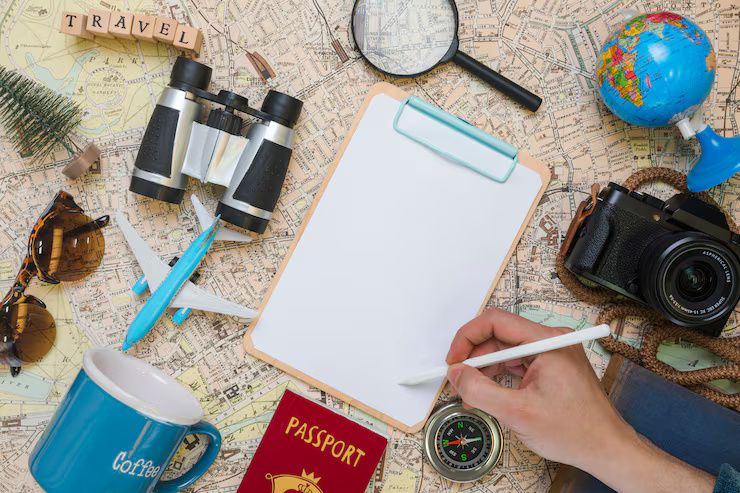Planning an international trip can be both exciting and overwhelming, especially if it’s your first time. From securing travel documents to booking flights, budgeting, and understanding visa policies, there are many steps to ensure a smooth journey.
The idea of structured travel planning exists to help travelers avoid last-minute issues like missed documents, poor itinerary choices, or budgeting errors. A good plan provides clarity, peace of mind, and an overall better travel experience.

Importance – Why trip planning matters today and who benefits
Travel has become more accessible and affordable, especially with budget airlines, online booking tools, and digital travel communities. Yet, proper planning remains crucial—particularly for first-time travelers venturing abroad.
Who it affects:
-
First-time travelers
-
Students going for exchange programs
-
Families planning vacations
-
Solo travelers and digital nomads
-
Employees going abroad for work or conferences
Why it matters:
-
Helps manage costs through smart booking
-
Ensures valid documentation and compliance with destination laws
-
Prevents travel anxiety and logistical errors
-
Improves safety by understanding local laws and customs
-
Allows for better cultural immersion and experience
Recent Updates – Travel trends and tips for 2024–2025
The international travel landscape continues to evolve. Here are some updates from the last year:
-
E-Visa adoption rising: Countries like Thailand, Malaysia, and Vietnam expanded e-visa access for Indian passport holders in 2024.
-
Digital health documentation relaxed: As of early 2025, most countries have eliminated COVID-specific requirements, though travel insurance remains essential.
-
Increased direct flight routes: More non-stop flights from Indian cities to Europe and Southeast Asia have launched, lowering travel times.
-
Currency exchange policies updated: RBI revised outward remittance limits under the Liberalized Remittance Scheme (LRS) in 2024 to ₹7 lakh annually without TCS for travel.
-
Travel tech rising: AI-powered itinerary apps and real-time travel advisory tools are being used widely to streamline trip planning.
Laws or Policies – Rules, regulations, and programs to know
International travel involves complying with both home country and destination country regulations. Here are key legal areas:
Indian laws affecting outbound travelers:
-
Passport Act, 1967: Requires a valid passport for international travel.
-
Foreign Exchange Management Act (FEMA): Regulates how much currency can be carried or spent abroad.
-
Income Tax Rules (TCS): As of 2024, a 5% Tax Collected at Source (TCS) applies if you spend over ₹7 lakh on foreign travel in a financial year.
Destination country policies:
-
Visa rules: Vary by country (e.g., Schengen visa for Europe, ESTA for the US, eTA for Canada). Always check embassy websites.
-
Customs regulations: Declare items like electronics, alcohol, and large cash amounts.
-
Travel insurance mandates: Countries like the UAE, Schengen Area, and Japan often require valid health/travel insurance.
Tools and Resources – Essential sites, apps, and planners
A well-prepared traveler makes good use of planning tools. Below are key resources:
Travel Booking Tools:
-
Google Flights and Skyscanner – Compare airfares
-
Booking.com and Agoda – Reserve hotels
-
Trip.com – For Asia-focused travel deals
Travel Apps:
-
TripIt – Organize travel itineraries
-
XE Currency – Real-time currency conversions
-
Google Translate – Language help in real-time
-
Rome2Rio – Find transport options between destinations
Government Resources:
-
India Passport Services – Apply or renew passport
-
Bureau of Immigration – Visa stamping and clearance info
-
Ministry of External Affairs – Travel advisories and embassy info
Templates and Checklists:
-
Packing checklist (clothing, documents, medicines)
-
Budget sheet (flights, food, visa, insurance)
-
Emergency contact list template
FAQs – Common questions about first-time international travel
Q1. How early should I start planning my first international trip?
Ideally, begin 3–6 months before your departure. This gives you time to get a passport (if needed), apply for a visa, research destinations, and budget accordingly.
Q2. Do I need a visa for all countries I travel to?
No, some countries offer visa-free or visa-on-arrival access to Indian passport holders. Always check the destination’s immigration site or consult a travel agent.
Q3. Is travel insurance mandatory for international trips?
While not required by all countries, travel insurance is strongly recommended. It covers medical emergencies, trip cancellations, and lost luggage.
Q4. Can I use my credit/debit cards internationally?
Yes, but you must enable international usage through your bank or app. Be mindful of foreign transaction charges and always carry some local currency.
Q5. What should I carry in hand luggage on an international flight?
Keep your passport, visa, tickets, ID proofs, chargers, essential medication, snacks, and a travel pillow handy in your cabin bag.
Final thoughts
Planning your first international trip doesn’t need to be stressful. With access to the right tools, clear guidelines, and awareness of legal policies, you can travel with confidence and ease.
Remember:
-
Start early and stay organized
-
Budget realistically and track expenses
-
Keep both digital and physical copies of essential documents
-
Always stay informed about the rules in your destination country
-
Most importantly, enjoy the journey and embrace the learning experience
Whether you're heading to Europe, Southeast Asia, or North America, the world is open — and with smart planning, your trip can be smooth, safe, and unforgettable.